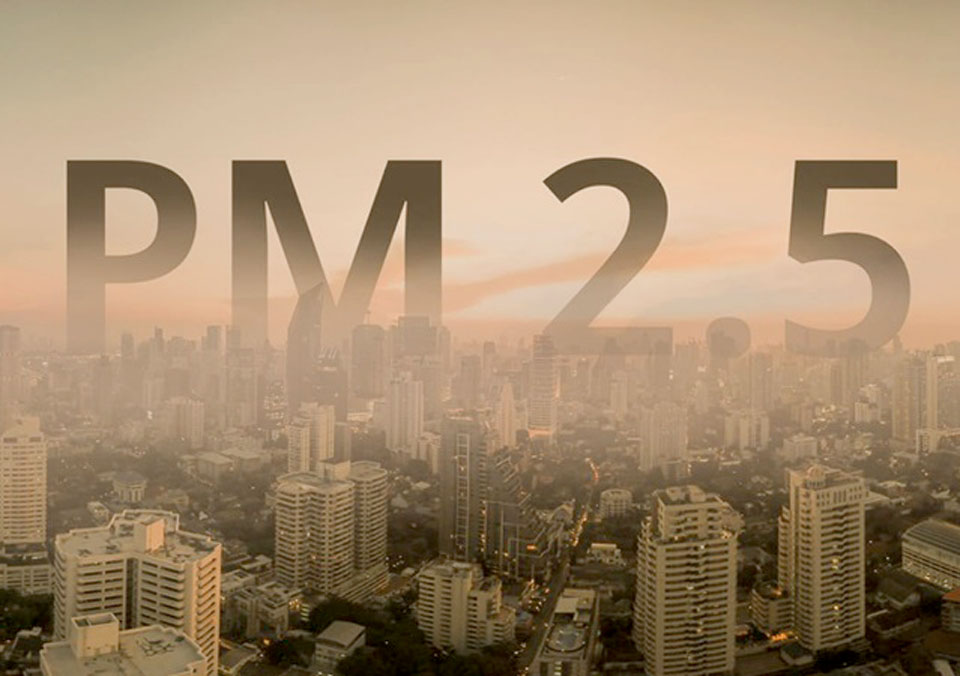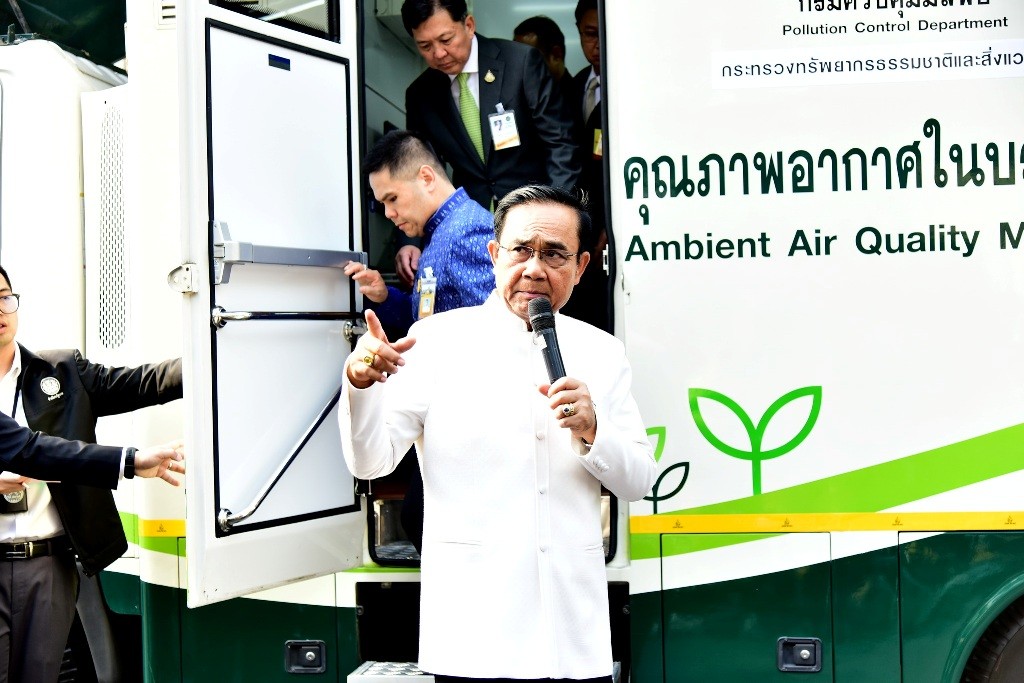Despite making Thailand’s PM2.5 air pollution crisis a national priority in 2019, the government has made little progress in providing people with clean air.
Due to the slow response, seasonal PM2.5 dust – the most dangerous form of haze pollution – has engulfed many parts of Thailand in recent years. Earlier this month, PM2.5 levels in Bangkok and Northern Thailand reached such dangerously high levels that the Bangkok Metropolitan Administration (BMA) pleaded with the capital’s businesses to reactivate the “work-from-home” mode.
The safe limit for PM2.5 (dust particles with a diameter of 2.5 micrometres or less) in Thailand is 50 micrograms per cubic meter of air. If PM2.5 levels exceed 100 micrograms, red health-hazard flags are raised.
On February 2, the Pollution Control Department reported that PM2.5 levels in more than 70 areas of the country reached health-hazard levels. The dangerously high smog levels persisted on February 3 and 4.
If PM2.5 levels exceed 100 micrograms per cubic meter of air for three days in a row, the government is supposed to take action. If this occurs, Prime Minister General Prayut Chan-o-cha should convene an emergency meeting with relevant agencies to implement emergency measures; provincial governors are expected to do the same in their respective areas.
“However, the government has been very quiet this year,” Sonthi Kotchawat, an independent environmental health expert told Thai PBS.
Is PM2.5 smog really a national concern?
The Prayut government has created a Smog Management Plan that will be implemented between 2019 and 2024. However, the public has seen few tangible results thus far. Thais have seen the smog situation deteriorate visibly. Meanwhile, Prayut has put at least three draft laws related to clean air on hold in recent years.
As a result, many people believe that the authorities have abandoned them to deal with the dangerous haze situation. With their health being harmed by rising levels of PM2.5, affluent families have turned to air purifiers for relief. Those who go outside in dusty conditions try to protect themselves with N95 face masks or other face coverings.
Demands for action
Vehicle emissions are a major source of air pollution. Thailand, on the other hand, has pushed back the transition to Euro 5-standard fuel from 2021 to January 1 of next year.
Sonthi also noted that the Bangkok Mass Transit Authority (BMTA), a state-owned enterprise, has been slow to introduce natural gas vehicle (NGV) buses. So far, only 489 of its 2,700 buses are powered by low-emission NGV.
“Today, most government vehicles use diesel engines as well. “It’s past time for them to switch to natural gas,” said the expert.
Climate change researcher and lecturer at Kasetsart University’s Faculty of Economics Assoc Prof Witsanu Attavanich proposed that the government implement tax incentives to encourage the use of environmentally friendly vehicles.
“In foreign countries, the higher the vehicle tax, the older the vehicle. But it’s the other way around in Thailand,” he explained.
If Thai authorities do not change their stance, old vehicles with Euro 2-4 standard engines will continue to be used and pollute the air, he added.
“Tax measures are useful. They have demonstrated clear results in other countries.”
Witsanu also suggested that authorities consider imposing congestion fees to discourage the use of vehicles in already congested and polluted areas such as city centres.
Large polluters
While vehicles are the primary source of PM2.5, a number of other factors contribute to haze. Factories, for example, pollute the air as well, but they often escape direct blame because Thailand lacks accurate data on the amount of PM2.5 they emit.
“At first glance, people may believe factories aren’t a problem,” Witsanu explained. “However, if you look closely, you will notice that the problem is undeniably present. The government does little to inspect small factories, which are numerous and are major polluters.”
Agriculture also contributes to Thailand’s poor air quality because farmers of corn, sugarcane, and rice frequently burn their fields during or after harvest.
According to records, farmers illegally burn several dozen tons of sugarcane each year to strip the cane of its leaves before harvest. Between December 1 of last year and February 2 of this year, nearly one-third of the sugarcane sent to factories was burned.
Despite the fact that farmers lose 30 baht per ton of sugarcane found to have sustained burn marks, and the government has set a goal of eradicating sugarcane-related agricultural fires by the end of this year, this is the case.
“We must put a stop to these agricultural fires or air pollution will worsen,” Witsanu warned.
Waiting for proper legislation
Between 2020 and 2022, six draft laws on PM2.5 were created. Prayut, on the other hand, has already cancelled three of them.
Bhumjaithai MPs proposed the Clean Air for People Bill on July 9, 2020. Later that month, civil society proposed a bill on clean air management. Move Forward MPs proposed the Pollutant Release and Transfer Register in 2021. (PRTR). However, because Prayut refused to support them, they were not brought before Parliament.
The government is still reviewing three other draft laws related to PM2.5. They are the Clean Air for Basic Human Rights Bill of the Pheu Thai Party, the Clean Air Bill of the Palang Pracharath Party, and the Clean Air Management for Integrated Healthcare Bill of the Thailand Clean Air Network.
“We are waiting with bated breath to see if our bill will be passed,” said Danaiphat Bhogavanija of the network.
The bill, which has the support of 24,000 people, seeks to make clean air a basic health right. The government fails to protect people’s health if it fails to provide clean air.
“It should be sued in that case,” Danaiphat said.
Penchom Saetang, director of the Ecological Alert and Recovery-Thailand Foundation, supports Move Forward’s polluter registration legislation, believing that it would provide people with information about where PM2.5 emitters are located and allow authorities to properly assess the situation and plan solutions.
Selling pollution-reduction policies
As the general election for this year approaches, political parties are discussing how they will reduce pollution and improve the environment to give Thais a better quality of life.
Noppadol Patama of the Pheu Thai Party said his party would introduce its Clean Air Bill as soon as it was elected to government. Meanwhile, the Move Forward Party has promised to reintroduce its bill to create a polluter registry.
If Bangkok voters support the Democrat Party in large numbers, the party will fight for a Clean Air Bill to protect their health.









